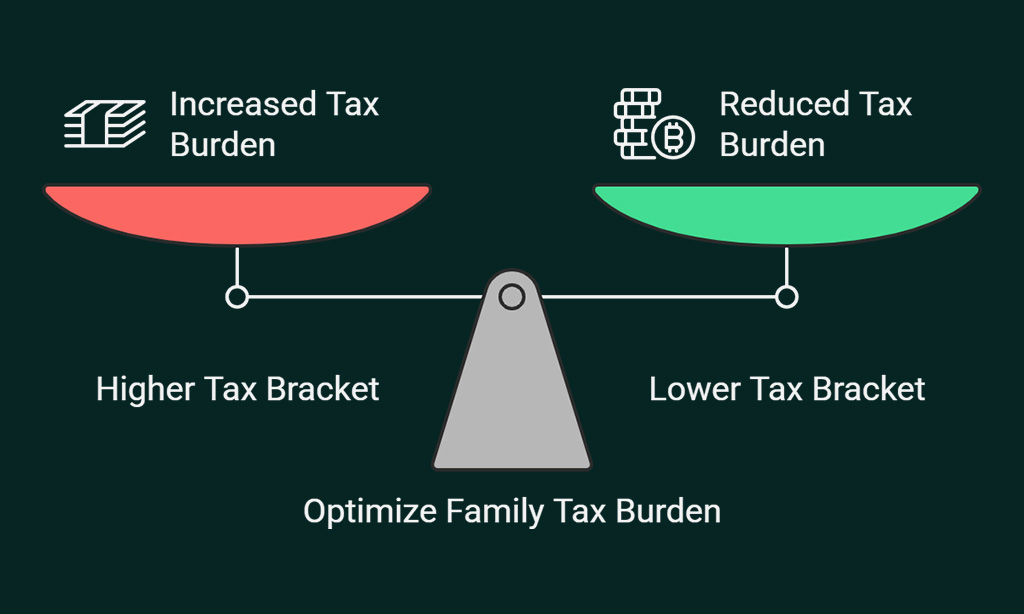Tax planning is crucial for high-net-worth individuals (HNWIs) in the UK who seek to protect their wealth and minimize tax liabilities. In a constantly changing tax environment, implementing effective strategies can make a significant difference in wealth preservation and financial security.
This article outlines 8 advanced tax planning strategies for high-net-worth individuals in the UK, providing actionable insights to enhance tax efficiency, secure long-term financial goals, and ensure wealth passes to the next generation in a tax-efficient manner.
Introduction to Tax Planning for High-Net-Worth Individuals
For high-net-worth individuals in the UK, tax planning is not just about minimizing taxes but also about protecting wealth and ensuring the sustainability of assets over time. The tax environment in the UK is subject to frequent changes, and failure to keep up with the latest tax rules can lead to higher tax burdens. Effective tax planning helps individuals:
- Minimize income and capital gains taxes through strategic investment choices.
- Maximize tax reliefs available under various schemes like ISAs, pensions, and trusts.
- Plan for inheritance tax to reduce the financial burden on heirs.
- Implement strategies that ensure a smooth and efficient wealth transfer to future generations.
By considering these tax-efficient strategies, high-net-worth individuals can safeguard their financial legacies, achieve greater financial security, and retain more wealth.
Overview of Key Strategies to Maximize Wealth Preservation
The following advanced tax planning strategies focus on tax-efficient investment vehicles, inheritance tax planning, charitable giving, offshore structures, family tax planning, and more. Each strategy aims to reduce tax liabilities, boost investment growth, and preserve wealth, ensuring financial prosperity for high-net-worth individuals.
Strategy 1: Utilizing Tax-Efficient Investment Vehicles
Selecting tax-efficient investment vehicles is one of the most powerful ways to protect and grow wealth while minimizing taxes. Tax-efficient investments not only reduce tax liabilities but can also enhance the returns on your investments over time.
ISAs (Individual Savings Accounts) and Their Benefits
An Individual Savings Account (ISA) remains one of the most straightforward ways to save and invest in a tax-efficient manner. ISAs allow investors to hold a variety of assets, including stocks, bonds, and cash, with no income tax on dividends, interest, or capital gains. The tax-free benefits of an ISA are especially important for high-net-worth individuals.
Key ISA Types:
| ISA Type | Main Benefits | Best For |
| Cash ISA | Tax-free interest earnings | Conservative savers |
| Stocks and Shares ISA | Tax-free investment growth and dividends | Growth-focused investors |
| Innovative Finance ISA | Tax-free returns from peer-to-peer lending | Those interested in alternative lending |
In the 2025/2026 tax year, the annual ISA allowance is £20,000. High-net-worth individuals can maximize contributions to ensure a significant portion of their assets grow free from tax, thus increasing their overall wealth over time.
Pension Contributions and the Impact on Taxable Income
Pensions are an extremely tax-efficient way for high-net-worth individuals to accumulate wealth for retirement while reducing their current income tax liability. Contributions made to a pension scheme are tax-deductible, meaning they lower the taxable income for the year in which they are made.
| Pension Type | Tax Benefits | Ideal for |
| Defined Contribution Pension | Tax relief on contributions and tax-free growth | Long-term retirement planning |
| Self-Invested Personal Pension (SIPP) | Control over investments, tax relief on contributions | Investors with more active strategies |
The annual allowance for pension contributions is £60,000 for the 2025/2026 tax year. Contributions exceeding this amount may face additional tax charges, but making the most of pension allowances is an essential strategy for reducing income tax and building retirement wealth.
Venture Capital Trusts (VCTs) and Enterprise Investment Schemes (EIS)
Venture Capital Trusts (VCTs) and Enterprise Investment Schemes (EIS) are excellent vehicles for high-net-worth individuals who wish to take on some investment risk in exchange for significant tax reliefs. These schemes offer:
- 30% income tax relief on investments up to £200,000 in VCTs.
- 30% income tax relief and capital gains tax exemption for EIS investments.
These tax incentives can dramatically reduce the immediate tax burden, while the growth potential from investing in early-stage, high-growth companies can also lead to substantial returns.
Strategy 2: Inheritance Tax Planning
For high-net-worth individuals, inheritance tax (IHT) can be one of the largest threats to family wealth. The good news is that effective planning can significantly reduce the impact of IHT, allowing you to pass on more wealth to your heirs.
Understanding Inheritance Tax (IHT) in the UK
Inheritance tax is charged at a rate of 40% on the value of an estate above the £325,000 threshold (the nil-rate band). However, various exemptions and reliefs can help reduce or eliminate the amount of inheritance tax payable.
| IHT Relief | Details | Eligibility |
| Spouse or Civil Partner Exemption | Transfers to spouses or civil partners are exempt from IHT. | All spouses/civil partners |
| Business Property Relief (BPR) | Relief on business assets, reducing IHT liabilities. | Business owners |
| Charitable Donations | Donations to registered charities are exempt from IHT. | All individuals |
Gifts and Lifetime Exemptions for IHT Reduction
One effective way to reduce inheritance tax is by gifting assets during your lifetime. The annual exemption allows gifts of up to £3,000 per year to be exempt from IHT. Additionally, gifts made more than seven years before death are generally exempt from inheritance tax, thanks to the 7-year rule.
Trusts as an Effective Tool for Estate Planning
Trusts are one of the most effective ways to reduce IHT exposure. By transferring assets into a trust, an individual removes those assets from their estate, thus reducing the taxable estate. There are several types of trusts, including:
- Bare Trusts: Simple trusts where beneficiaries have direct rights to the assets.
- Discretionary Trusts: Trustees have discretion over how the assets are distributed.
Types of Trusts to Consider for Wealth Preservation
| Trust Type | Benefits | Suitable For |
| Bare Trusts | Beneficiaries have immediate control of assets. | Direct heirs |
| Discretionary Trusts | Trustees control distribution, providing flexibility. | Families with complex asset distributions |
| Interest in Possession Trusts | Beneficiaries receive income for life, with capital passing later. | Long-term wealth management |
These strategies can significantly reduce inheritance tax liabilities and ensure that more of your wealth is passed on to your heirs.
Strategy 3: Charitable Giving and Tax Relief
Charitable giving is not only a way to contribute to society but also an excellent method of reducing tax liabilities. In the UK, donations to charity can reduce your taxable income and provide significant tax relief.
How Charitable Donations Can Lower Your Tax Burden
Donating to charity allows individuals to benefit from Income Tax Relief through the Gift Aid scheme, which allows charities to claim back 25% of the donation from HMRC, and the donor can also claim tax relief on the donations. If you are a high-net-worth individual, you can further enhance your charitable giving strategy by donating larger sums through Donor-Advised Funds (DAFs).
Donor-Advised Funds (DAFs) and Their Role in Tax Planning
DAFs provide a flexible way for individuals to make donations over time. They also allow individuals to claim immediate tax relief on the contributions while still maintaining control over how and when donations are made.
| Benefit | Impact |
| Immediate tax relief | DAF donations are tax-deductible. |
| Control over distribution | Donors can advise how funds are distributed. |
| Long-term charitable impact | Ongoing giving opportunities. |
Strategy 4: Tax Relief through Business Ownership
Owning a business presents unique opportunities for tax relief, especially in terms of capital gains tax (CGT) and business property relief (BPR).
Capital Gains Tax (CGT) Relief for Business Owners
One of the most powerful tax reliefs available for business owners is Business Asset Disposal Relief (BADR), which reduces CGT to 10% on gains up to £1 million on the sale of qualifying business assets.
Business Property Relief (BPR) and Its Significance for IHT
For family business owners, BPR allows business assets to pass on to heirs without incurring inheritance tax, ensuring that the family business is preserved for future generations.
Structuring Your Business for Maximum Tax Efficiency
Consider structuring your business as a holding company, which can help separate income-generating activities from other assets and optimize tax planning. Consulting with tax advisors to implement the best structure for your business is essential for minimizing tax exposure.
Strategy 5: Offshore Tax Planning
Offshore tax planning can provide substantial tax advantages for individuals with international interests or assets. By establishing structures in jurisdictions with favorable tax regimes, high-net-worth individuals can reduce their tax burden.
Benefits and Risks of Offshore Tax Planning
Offshore structures, such as trusts, holding companies, and bank accounts, can help reduce tax liabilities by taking advantage of lower tax rates in jurisdictions with favorable tax laws. However, offshore planning must be done with caution, ensuring compliance with international tax regulations and reporting requirements.
| Offshore Jurisdiction | Tax Benefits | Popular Structures |
| Jersey & Guernsey | Favorable trust laws and tax rules | Trusts, holding companies |
| Cayman Islands | No direct taxes on income or capital gains | Trusts, investment funds |
| Switzerland | Low tax rates and banking secrecy | Trusts, foundations |
Regulatory Considerations When Using Offshore Structures
While offshore tax planning can be beneficial, it is essential to ensure compliance with the Common Reporting Standard (CRS) and anti-money laundering (AML) regulations to avoid legal issues.
Strategy 6: Income Splitting and Family Tax Planning
Income splitting involves distributing income across family members in lower tax brackets to reduce the overall tax burden for the family.
Dividing Income Among Family Members to Minimize Tax
Income splitting can be done through gifts, joint accounts, and family trusts. By allocating income to family members in lower tax brackets, it is possible to significantly reduce overall family tax liabilities.
The Role of Family Trusts in Wealth Distribution
Family trusts offer a flexible way to distribute wealth to multiple family members, allowing for tax-efficient income splitting and long-term wealth preservation.
Tax-Efficient Strategies for Passing Wealth to the Next Generation
Using family trusts or gifting assets can ensure that wealth is transferred efficiently while minimizing the tax implications for heirs. Implementing these strategies early can result in substantial tax savings.
Strategy 7: Capital Gains Tax (CGT) Mitigation
Mitigating capital gains tax (CGT) is essential for high-net-worth individuals who regularly sell assets or investments.
Planning for CGT to Reduce Liabilities
By managing the timing of asset sales and using allowances effectively, high-net-worth individuals can reduce their CGT exposure.
Timing and Tax-Efficient Sales of Assets
Timing the sale of assets to align with your tax planning strategy can help reduce CGT liabilities. For instance, selling assets in years when you have lower income can help minimize CGT exposure.
Strategy 8: Real Estate Tax Planning
Real estate investments often form a substantial part of high-net-worth individuals’ portfolios. Understanding the tax implications of property ownership can help reduce tax exposure.
Tax Implications of Property Ownership in the UK
High-value properties are subject to Stamp Duty Land Tax (SDLT), which can significantly increase the cost of purchasing real estate. Understanding the tax rules surrounding real estate can help individuals avoid unnecessary costs.
Structuring Real Estate Investments for Optimal Tax Outcomes
Real estate investments can be structured in tax-efficient ways through joint ventures, family trusts, or limited liability companies. These strategies can help reduce SDLT liabilities and ensure tax efficiency in property dealings.
Wrap Up
The 8 advanced tax planning strategies for high-net-worth individuals in the UK offer valuable tools to reduce tax liabilities, preserve wealth, and ensure long-term financial security.
By utilizing tax-efficient investment vehicles, planning for inheritance tax, leveraging charitable giving opportunities, and taking advantage of tax reliefs available through business ownership and offshore planning, HNWIs can maximize their wealth retention strategies.
Consulting with tax professionals is crucial to navigate the complexities of UK tax law and ensure these strategies are implemented effectively. With the right plan in place, high-net-worth individuals can achieve financial peace of mind while minimizing their tax burden.










































